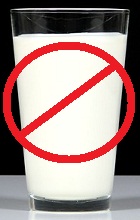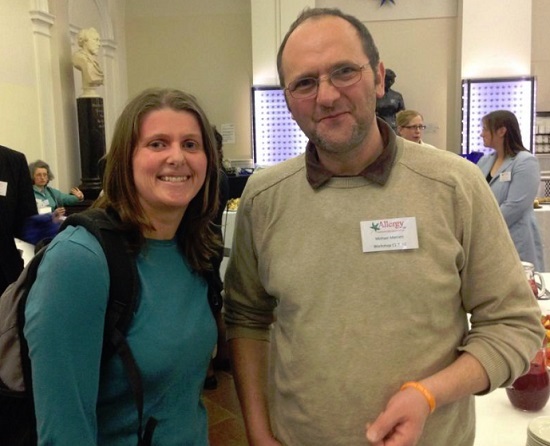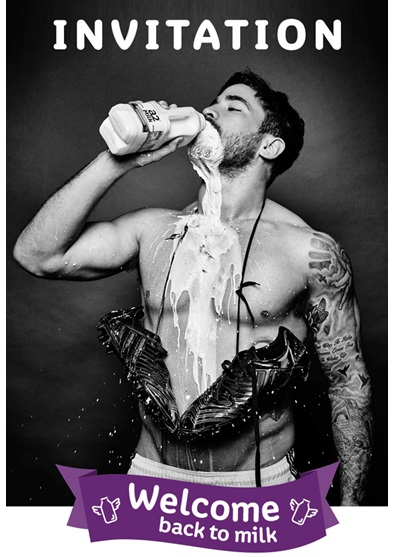The raw milk debate is raging as we speak and was featured on Radio 4 only last week. Basically raw milk is milk which has not been pasteurised and treated to remove bacteria and increase shelf life; a process which began to become commonplace in the UK after the first world war.
On the BBC Radio 4 Food Programme, called, “What is milk?” Sheila Dillon interviewed Professor Peter Atkins, author of “Liquid Materialities: A History of Milk, Science and the Law”, which charts the changing stuff that we call milk. The programmed discussed how Raw milk, despite being banned in Scotland and sold with a health warning in England and Wales, has seen sales grow recently, a result of farmers markets, online sales, and the beliefs of many that raw milk straight from the cow is a fundamentally different substance.
Dr Natasha Campbell McBride was also interviewed on the show. She advocates raw milk for many of her patients for a range of conditions, including lactose intolerance. She formed Be Healthy, an independent consultancy and distribution partnership with Peter Campbell-McBride and is a fully qualified medical doctor with a special interest in human nutrition. She claims that enzymes, nutrients, proteins etc. are killed during pasteurisation and it becomes a dead product; her patients can often tolerate raw milk even if they previously had an intolerance to milk.
To find out about modern raw milk production Sheila also visited ARLA who produce Cravendale filtered milk (which lasts much longer than normal milk) and Hook & Son, who sell raw milk online and through farmers markets. Hook & Son follow very strict hygiene guidelines to ensure their raw milk is safe to drink. Farmers are paid approximately only 28p per litre of milk they produce when it goes for pasteurisation, however a raw milk farmer can name their price and have complete control of how they treat, market and sell their raw milk.
You can listen live here.
It wasn’t something I knew very much about so I decided to find out more. Today we drink skimmed, semi-skimmed, whole, UHT, 1% low fat milk, filtered, goat, sheep, soya, rice, oat and even potato milk, but here we’ll discuss the much maligned raw milk. Basically it’s milk which has not been pasteurised and treated to remove bacteria. The first pasteurisation test was completed by Louis Pasteur and Claude Bernard on 20th April 1864. He was best known to the general public for inventing a method to stop milk and wine from causing sickness, a process that came to be called pasteurisation.
Pasteurisation is a process wherby milk is heated to over 70 degrees to remove bacteria, make the milk last longer and render it safer to drink. Ultra Pasteurisation gets it even hotter to create UHT milk which will last years in a sealed carton. Milk’s popularity has dropped as more people follow a low fat diet and cut milk out of their diets, or try alternative milk products.
Raw milk is milk which has come straight from the cow to your fridge, and the debate is on as to whether this is actually far better for you to drink. The reason being it still contains the bacteria and organisms which the human body needs to aid digestion and is also packed full of nutrients and goodness. The process of pasteurisation kills these healthy bacteria as well as all the goodness in the milk and is widely held to be the cause of the ever growing number of milk and dairy intolerant and allergic people.
Should we know exactly where the milk we drink has come from? Just as many of us do when buying meat, bread and other organic produce. When you buy pasteurised milk from the supermarket you can have absolutely no idea where it’s from or how the cows who produced it lived and were treated.
It’s not easy to buy raw milk in the UK but there are farms who will supply it. It is sold for animal and pet consumption in the UK but generally not for human consumption. However Raw milk advocates swear by it, claim to be healthier and happier and compare the shop bought milk to processed food. However on the other hand, some experts claim that raw milk is dangerous to drink and can make you ill. So who do we believe?
We originally started to mass treat our milk to make it love longer, not necessarily due to worries about disease and illness, but surely if the cow is healthy the milk will be good too? In the US there is a whole industry growing up around the raw milk movement and you can buy it in shops and supermarkets in some states.
Foods Matter website have interesting information which has some great links to research reports and other resources, as well as some farms who supply raw milk. Read Raw Milk
All the sources I’ve read have either been from raw milk advocates who say it’s safe, better for you, and that cows reared for raw milk production are fed organic feed, are free range and kept in hygienic conditions. Is the only reason we ever pasteurised our milk because cows were being farmed intensively and so kept in unhygienic conditions? The other sources say that pasteurisation is totally necessary and that raw milk is bad for you and should not be allowed, indeed it’s banned in Scotland and some states of the USA.
The US Food and Drug Administration (FDA) is very pro pasteurised milk and claims it’s much safer and states that many diseases are caused by raw milk.
An article by Jennifer Read, owner of ‘My Life in the slow lane’, a social website for people who grow, cook and eat organic food, entitled “Organic Raw Milk – Is it Dangerous?” shares the following:
But according to the Weston A. Price Foundation, unpasteurised milk is higher than pasteurised milk in Vitamin C, Calcium, Folic acid, Vitamin B12, Vitamin B6, Vitamin A, Vitamin D, Iron, Iodine and minerals. Many raw milk consumers believe it is responsible for building up their immune systems and relieving their allergies.
It would be really interested to conduct a study comparing two separate test groups, one given raw milk and one given pasteurised and compare their health at various stages in their lives. This would really be the only way to prove one way or the other which is best. I couldn’t find any examples of such studies. Do any exist? Is anyone considering conducting such a study?
Would someone with a severe allergy to dairy be able to tolerate raw milk? I suspect not, but perhaps with treatment to desensitise they could go on to tolerate raw milk in the future. People who grow up on farms and drink milk straight from the cow rarely have allergies. Farmers – is this true? So are there any raw milk drinkers out there? Do you have any allergies? Any raw milk lovers? Why do you swear by it? Anyone in the UK who is buying raw milk? Is this easy to do? Does it taste the same? Is it much more expensive?
I can’t try Raw Milk since I have a life threatening allergy to all dairy but I’d love to hear from all those out there who do, or people with an intolerance would like to try it.













This is all very well, but what about the fundamental peculiarity of drinking the milk of another species into adulthood. With all that is attached to the production of the substance and its constituents, i see absolutely no reason to drink it. If we are talking about allergies there are too many factors to ignore such as casomorphines, a morphine type substance designed to keep the calf near the mother. http://en.wikipedia.org/wiki/Casomorphin Also, a cow has to give birth every year and have her calf wrenched from her each time. It’s all such a ghastly process, and so unnecessary. Sorry to be so controversial, but trust these are appreciated as fair points.
Hi Alex. I wrote another article called, “Can’t drink milk? You’re normal!” a few months ago and I agree entirely with your reasoning. You can find a link to this on my home page and my blog SHOULD list it at the end of this article if it’s working properly. What it doesn’t explain, is that just because we feel an industry is wrong, unethical etc. doesn’t explain why people become allergic to milk. I drink soya, rice and oat milk and have recently become concerned that these are rather ‘processed’ too. Rice milk makers were fairly pricey when I last checked them out but perhaps I should consider that again. On another note, Innocent smoothies pasteurise their fruit smoothies (they say it undergoes minimal pasteurisation) – does this remove many of the natural nutrients and enzymes that would be present if the smoothie was fresh? How much goodness is lost? Let’s have a heated, but not pasteurised debate!
Ok. I’m with you 100% there. Even forget “heat treated” too – teach people to make their own.
Put some almonds to soak before going to bed and in the morning whiz up with water and strain or put in a smoothie using fresh fruit! Food manufacturers are killing our creativity in the kitchen, no matter how much easier we think it makes our lives. Like anything, it’s just a matter of retraining our habits and could save trips to the doctors too.
Porridge, if made right, is creamy and doesn’t need milk. Add some soaked nuts/seeds if desired.
Having said that, raw, fresh goats’ milk is delicious but a luxury and i feel should always be considered so as not designed for us humans to drink on a regular basis. I consider milk a strong supplemental food – like meat – and not generally necessary. There are some unpasteurised cheeses available of course.. As soon as a substance is heated it has undergone some processing and if it sits around on a supermarket shelf for a bit it becomes even more lifeless. Not great. Milks in tetra packs are just so weird. I use them at times, but they don’t make my body “sing”.
I worked a few months on a goat farm once. It was the only time i ever appreciated the pleasure of drinking milk. Frozen unpasteurised milk is obtainable – some health food stores stock it. But it’s just not the same as milk straight from the udder which reinforces my point that it is a luxury only coming available as the result of the slaughter of baby goats. I’ve seen the process. It’s not nice so i cannot condone it. Sorry to harp on… x
PS.. Being aware i took things off on a slight tangent, i yet must say you write highly informative articles. Thanks Ruth! I feel that anything that gets people thinking about the process of food to table is a really really good thing. Awareness is all – awareness is being alive!
Alex that is exactly what I want people to do. Question EVERYTHING! We get fed quite a lot of rubbish from supposed experts, drugs only benefit pharmaceutical companies and doctors. The answer is in what we consume and how we live. World is going mad. Love your comments by the way. Can’t beat a heated debate!
Thanks to Alex for posting this on the facebook what allergy page. If you’re interested in raw milk this video might tickle your fancy… http://www.youtube.com/watch?v=lW6BgwqFw5w
Today Natural News featured this article: http://www.naturalnews.com/031501_raw_milk_restrictions.html about Raw Milk. Even as the evil empire of the FDA tries to destroy raw milk and raw cheese, several states are working on legislation to legalize raw milk for their citizens.
I saw this today in Natural News. Cloned Milk is on its way! http://www.naturalnews.com/031528_cloned_milk_agriculture.html
How can there be such uproar about people drinking raw milk, and yet ministers seem hell bent on introducing cloned milk and meat into our diets by stealth. We wouldn’t even know what we were eating. Really makes me want to become vegan and live on a commune…
Thanks for sharing your thoughts about raw milk better for
allergies. Regards